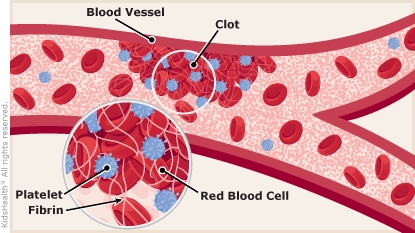Blood Clot: How to Care for Your Child
Blood clots happen for many different reasons and are usually treated successfully with medicines called anticoagulants. These medicines are also called "blood thinners," even though they don't thin the blood. They prevent blood from clotting and stop blood clots from getting bigger. Your child's specialist will tell you if your child needs to stay on a blood thinner and for how long.


While your child is taking a blood thinner:
-
Make sure your child takes all medicines on time and as directed.
-
If your child misses a dose, call your specialist right away.
-
Don't give medicines that your specialist told you to avoid. Some medicines cannot be used while your child takes the blood thinner.
-
Ask the specialist before giving new medicines (prescription or over-the-counter) or herbal remedies.
-
Do not give aspirin, ibuprofen (such as Advil® or Motrin®), or other non-steroidal anti-inflammatory medicines while your child takes the blood thinner.
-
Your child shouldn't eat large amounts of spinach, kale, broccoli, or other green leafy vegetables that are high in vitamin K.
-
If your child takes a blood thinner for a long time, ask your health care provider whether it needs to be stopped before surgery or dental procedures.
-
If your child gets a scratch or cut, check the skin carefully and watch for bleeding that doesn't stop.
-
Follow your specialist's instructions about which activities your child should avoid while taking a blood thinner.
-
Tell staff at your child's school or child care about your child's condition and the possible side effects of the blood thinner.

Your child:
-
has discomfort in the arms, back, neck, jaw, or belly
-
has pain, redness, warmth, or swelling in the leg
-
is taking a blood thinner and has nosebleeds or blood in the urine (pee)
-
has a fever that doesn't go away

Call 911 right away if your child has chest pain, is short of breath, has skin that looks blue, or seems confused.

What causes blood clots? In kids, blood clots most often are due to central venous lines and peripherally inserted central catheter (PICC) lines. They also can happen if a child doesn't use a leg or other part of the body for a long time.
Can other conditions cause blood clots? Blood clots may happen when a child has too many platelets (blood clumping cells) or problems with certain proteins in the blood. Some kids are born with one or more genetic defects that cause blood clots, even though their parents don't have the problem. A blood clot also can develop after an injury, surgery, infection, or treatment for a disease.